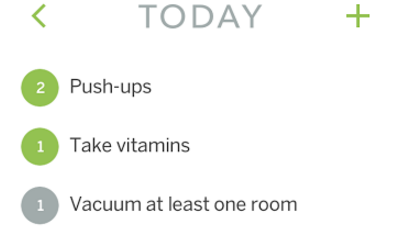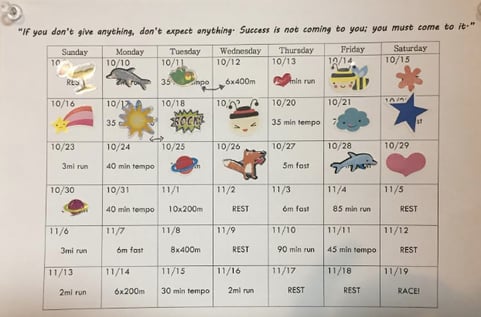In just under six months, I will be running my first marathon. And it’s a big one: the Boston Marathon.  Training for this is going to be a huge endeavor that will require some serious goal-directed persistence and integration of just about all the rest of my executive function skills. As an executive function coach, I am fortunate to have many tools and strategies to approach all that goes into this race. I will be using the same concepts I teach my students and truly “practicing what I preach” in order to come out of the race in one piece. The focal points of preparation for my training will be making a specific and realistic plan, keeping myself accountable, and celebrating even the smallest of successes. I will document my progress toward my goal in a 3-part blog series highlighting preparation, process, and reflection.
Training for this is going to be a huge endeavor that will require some serious goal-directed persistence and integration of just about all the rest of my executive function skills. As an executive function coach, I am fortunate to have many tools and strategies to approach all that goes into this race. I will be using the same concepts I teach my students and truly “practicing what I preach” in order to come out of the race in one piece. The focal points of preparation for my training will be making a specific and realistic plan, keeping myself accountable, and celebrating even the smallest of successes. I will document my progress toward my goal in a 3-part blog series highlighting preparation, process, and reflection.
Making a Plan
Making a specific and realistic plan with reminders and some wiggle room for “the unexpected” will be the best way to set myself up for success. While there are many marathon training plans out there, these plans don’t account for the realities and scheduling intricacies of life. Like many of my students, I have a lot going on! I work in two schools, provide executive function coaching to five wonderful students, supervise some awesome executive function coaches, play on two field hockey teams, somehow convince my husband to stay married to me, and maintain a social life. Just like my students, whose lives are packed with commitments and obligations, I need to customize my running plan according to my needs. I encourage many of my students to have a shared google calendar with their parents in order to have an idea of the best times to schedule social or academic events. This is a strategy that my students can use not just during their time in academics, but for a lifetime. Just like them, I will use a shared google calendar for my marathon training, as I can consider my husband’s schedule when planning training runs.
 Another tool that will be integral in my training is Habit List. Like many of my students, I have a lot of things to keep track of! Aside from the urgent and important tasks that take up a lot of my time, the iPhone app Habit List reminds me to keep track of the important tasks that are not quite as urgent. While my students may be using Habit List to remind them to switch out their gym clothes or practice tuba regularly, I will be using this very same strategy to remember to drink enough water and keep my house clean. When life gets busy, we all need a little support, and my students are learning tools that they will be able to use as busy adults (like when they are crazy enough to run a marathon).
Another tool that will be integral in my training is Habit List. Like many of my students, I have a lot of things to keep track of! Aside from the urgent and important tasks that take up a lot of my time, the iPhone app Habit List reminds me to keep track of the important tasks that are not quite as urgent. While my students may be using Habit List to remind them to switch out their gym clothes or practice tuba regularly, I will be using this very same strategy to remember to drink enough water and keep my house clean. When life gets busy, we all need a little support, and my students are learning tools that they will be able to use as busy adults (like when they are crazy enough to run a marathon).
Keeping Myself Accountable
I have been a runner for a very long time, but I know that “being a runner” isn’t enough to prepare my body and mind for a marathon. I know that I need to maintain a growth mindset toward this race in that I need to put in a good amount of work in order to meet my goal. I plan to keep myself accountable with tools such as a sticker chart, check-ins with my running coach, and open communication about my training with my loved ones. All of these tools will keep me going and help me get back on track in case I slip into a Netflix marathon on some snowy Sunday when I’m supposed to be out running 22 miles.
Celebrating Successes
I was serious about the sticker chart. I have set myself up with a month-by-month training plan that I have printed out. Each time I complete a day’s workout (or rest on a prescribed rest day) I reward myself with a sticker. I have set up a larger system where I can earn a new shirt, a manicure, a massage, etc. based on the amount of stickers I have earned. Considering the amount of work that needs to go into my goal, I can anticipate that I need to tap into both intrinsic and extrinsic motivation in order to maintain momentum.
This month’s sticker chart:

I am excited to get started with my marathon training and I feel very prepared with tools and strategies to navigate the many aspects of my goal. Stay tuned to hear how my training is going and how my implementation of these tools has supported my success! You can be certain I'll be sharing my progress with the students I coach, to show them that I use the very same techniques to keep myself on track in adult life as they have learned to use to keep on track in their academic lives.
Does your child have a school project to complete? Download our Project Planner template to help stay on track, keep accountable, and prevent last-minute project panic.
(Maria is running the Boston Marathon to support Dana-Farber Cancer Institute. See her personal page here: http://www.runDFMC.org/2017/mariah)
photo credit: marcovdz Sunset Run via photopin (license)

